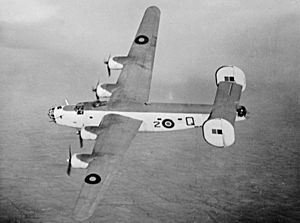No. 86 Squadron RAF facts for kids
Quick facts for kids No. 86 Squadron RAF |
|
|---|---|
| Active | 1 September 1917–4 July 1918 6 December 1940–25 April 1946 |
| Country | |
| Branch | |
| Part of | Coastal Command |
| Motto(s) | Latin: Ad libertatem volamus ("We fly to freedom") |
| Aircraft | Bristol Blenheim Bristol Beaufort Consolidated Liberator |
| Engagements | World War II |
| Insignia | |
| Squadron Badge heraldry | A gull volant, carrying in the beak a flash of lightning |
| Squadron Codes | BX XQ |
No. 86 Squadron RAF was a special flying unit of the Royal Air Force during World War II. They were part of Coastal Command. Their missions included looking for enemy ships and submarines, helping rescue people at sea, and even attacking enemy ships.
Contents
History of No. 86 Squadron
Early Days and World War I
No. 86 Squadron first started on September 1, 1917. However, it didn't get to fly any missions. The squadron was stopped on July 4, 1918. This happened because its pilots and planes were needed to help other units fighting in France. It tried to start again in October 1918, but the war ended soon after. So, it didn't fully form that time.
World War II Missions
The squadron was formed again on December 6, 1940. At first, they flew Blenheim planes. These planes helped protect groups of supply ships, called convoys. In June 1941, the squadron got new planes called Beaufort torpedo bombers. These planes could drop torpedoes to attack ships.
On July 15, they started laying mines in the sea. Mines are like underwater bombs that can damage enemy ships. For three months, they flew missions to find out what the enemy was doing. They also helped rescue people who were lost at sea. On December 12, they started using their torpedo bombers to attack enemy ships.
In March 1942, the squadron moved to northern Scotland. From there, they flew patrols and attacked targets along the Norwegian coast. By early 1943, they changed to even bigger planes called Liberators. In March of that year, they moved to Northern Ireland. Their main job there was to fly anti-submarine patrols. This meant they looked for and attacked enemy submarines.
A year later, they moved to Reykjavík, Iceland, to continue their patrols. In July 1944, the squadron returned to Scotland. They stayed there for the rest of the war. No. 86 Squadron was very good at fighting submarines. They destroyed fourteen enemy submarines during World War II.
After the War
On June 10, 1945, after the war ended, No. 86 Squadron joined a group called Transport Command. They flew missions all the way to India. Finally, on April 25, 1946, the squadron was officially stopped.
Aircraft Used by No. 86 Squadron
No. 86 Squadron flew several types of aircraft during its time. Here are the planes they used:
| Aircraft Type | Dates Used |
|---|---|
| Bristol Blenheim Mk.IV | December 1940 to July 1941 |
| Bristol Beaufort Mk.I | June 1941 to February 1942 |
| Bristol Beaufort Mk.II | January to August 1942 |
| Consolidated Liberator Mk.IIIa | October 1942 to August 1944 |
| Consolidated Liberator Mk.V | March 1943 to February 1945 |
| Consolidated Liberator Mk.VIII | February 1945 to April 1946 |
| Consolidated Liberator Mk.VI | August 1945 to April 1946 |
 | Sharif Bey |
 | Hale Woodruff |
 | Richmond Barthé |
 | Purvis Young |


